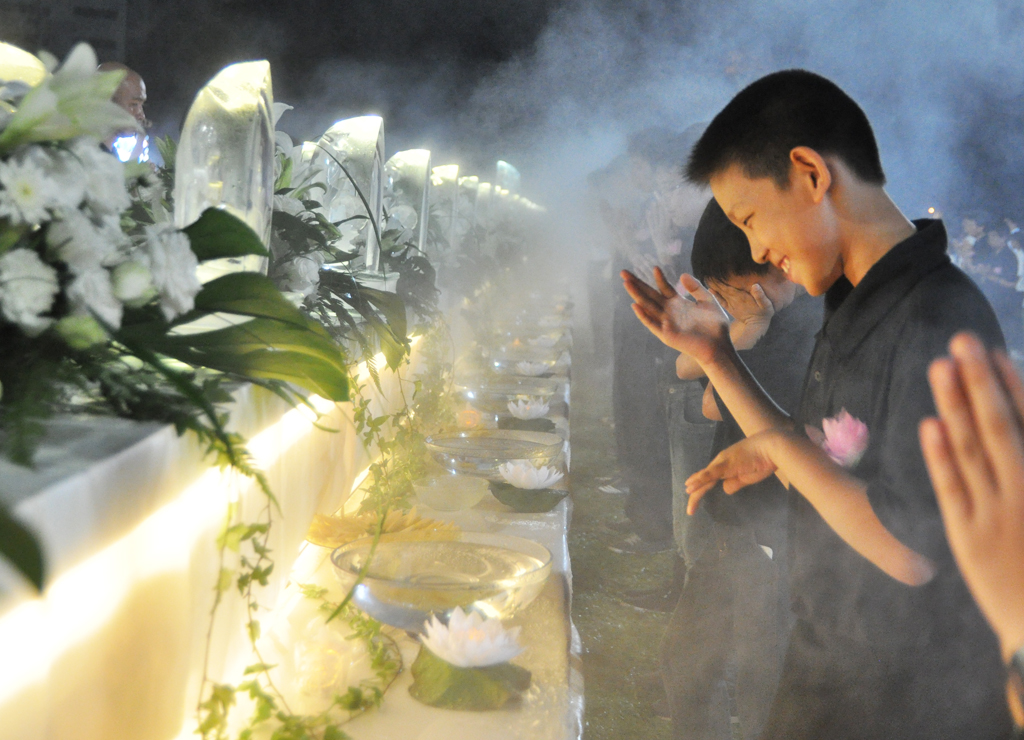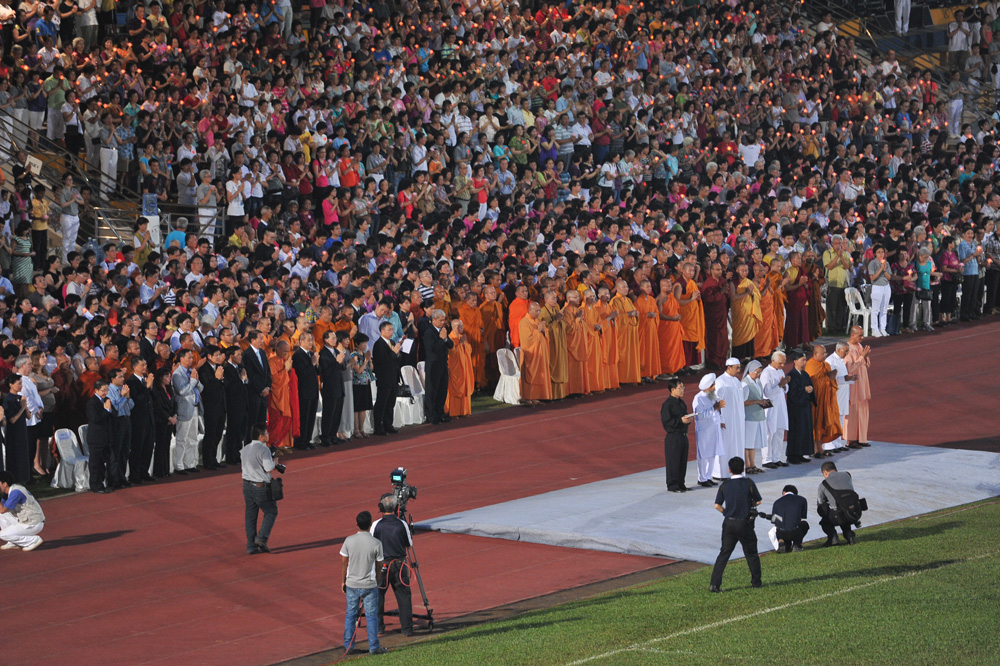
KL businessman Lin Xiao Shi shares how in the past, he lead a wealthy life and lost himself amidst a harried lifestyle and ignorance. (Photo by Lai Tong Heng)
“I’ve loved money since I was very young; I did not know how to iron clothes, but I certainly knew how to iron dollar notes!”Malaysian businessman and Tzu Chi volunteer, Lin Xiao Shi further elaborated how he could not bear to spend the RM500 and RM1,000 notes he earned, neatly ironing them flat before slipping them in between the pages of books for safekeeping. Whenever he had accumulated a sum of ten thousand or so, he would toss the notes high into the air while on his bed, and as the dollar bills rained down upon him, the happiness in his heart knew no bounds.
Lin, who had been actively involved with Tzu Chi for many years, had always felt that he was not a good role model and was thus unwilling to share his experiences with the rest. Yet, a single sentence from Master Cheng Yen explaining that even those who are not good role models are in actual fact also considered to be a type of role model for others, caused him to have a change of heart. With renewed confidence, he decided to share his life’s turning points with others, and on 5 March 2014, together with fellow entrepreneur Fang You Quan, they accepted the invitation from Singapore volunteers and participated in the entrepreneurs sharing session.
Giving is the Most Meaningful Investment in Life
In front of 250 other participants, Lin laid bare the details of his spiritual journey. “(While) Tzu Chi’s four missions were charity, medicine, education and humanity, my own “four missions”were wine, women, wealth and negative habituations. I was creating evil karma while Tzu Chi was creating blessings.”
Lin had loved frequenting entertainment and nightlife venues since he was young, and had friends from both sides of the law. With the thought that raking in money was the greatest happiness in life, he worked hard to expand his business, opening many discotheques, snooker clubs, arcade gaming centres and karaoke clubs etc. in Kuala Lumpur. He even opened the world’s largest KTV outlet. Yet the more money he made, the more unhappy he became. Buried in the demands of his work, he wandered amidst ignorance and darkness in that period of his life. “On the outside, I appeared to have all the trappings of wealth but inside, I was miserable beyond words; I had to take sleeping pills every night.”
The busy life that Lin lead left him jaded. He frequently had to drink and entertain friends and business partners, and every day, his energies were exhausted in the pursuit of wealth, name and sensual pleasures. In leading such a nocturnal lifestyle, he hardly saw his family and his own home began to seem like a hotel to which he returned only to sleep. Swept along by the demands of his own life, he could not even venture out alone without the company of a bodyguard. In his heart, he yearned to be free, yet he did not know how to let go of everything he had.
Things continued in this manner till 2004, when Lin’s sister suggested that he donate an available shop space which could not be rented out to Tzu Chi. Though he was not familiar with the organization, Lin agreed without hesitation once he heard that it was engaged in charitable works. Once, on a trip to Malacca, Lin had the opportunity to visit the branch office there. Impressed by the warmness he experienced in the free clinic and book café, he made a donation and was later invited to attend the Global Entrepreneurs Camp in Taiwan. This marked the turning point in Lin’s life.
During the camp, Lin was deeply moved by the experiences of volunteers and the hard work and sacrifices of the monastics. He realized that Tzu Chi had accomplished many commendable works of good for the benefits of others, and at that moment, he made a silent vow in his heart. Upon returning to Malaysia, he enquired if the CEO of the Tzu Chi KL and Selangor branch office needed any help. This resulted in Lin donating the land which he had originally intended to use for the building of a hotel, to Tzu Chi for the purpose of setting up the Jing Si book café and continuing education centre.
In 2006, a plot of land in Kepong was sourced by Lin. At that point, the KL and Selangor branch had yet to find an ideal plot of land to locate its premises and Lin, knowing of this, mulled over the issue for a week. However, his hesitation disappeared when he observed the current landowner’s eagerness to sell; Lin realized that wealth was not everything, furthermore, it was the existence of Tzu Chi and Master Cheng Yen that sparked off the change in himself. Hence, his mind made up, he donated the land for t construction of Jing Si Hall.
“When one gives, so too, shall one receive,”Lin says. When he donated his shop space, Lin also opened a new chapter in his life. He began helping out in Tzu Chi activities such as house visits, free clinics and international humanitarian efforts, and also visited the Great Love Village in Indonesia. Seeing the suffering of others unfold before his eyes, he was both moved and shaken.
“Indulging in sense pleasures brings short-lived happiness but the joy in helping others is everlasting.”Lin relates how the life he used to lead seemed to be a happy one, yet those days have faded into the past, while the joy he experienced in lending a helping hand to others is still fresh in his mind. In the aftermath of a tsunami disaster in Sri Lanka, Lin had participated in humanitarian relief efforts for the survivors, and seeing the devastation of the whole village, he was struck by the impermanence of life.
Deriving Happiness from a Life of Purity
Two years ago, Lin together with a group of Tzu Chi volunteers visited Sabah and invited timber merchant Datuk Fang You Quan to attend a retreat in Taiwan and welcomed him to join the organization.
Datuk Fang describes himself as a proud and arrogant man who cared only about making money. He used to pass his days gambling, drinking, smoking and feasting, ignorant of the evil karma he was creating. His wife, a Buddhist, was concerned and had tried many ways and means to get him to change but to no avail. Finally, she encouraged him to sign up for Tzu Chi’s Global Entrepreneurs Camp.
Datuk Fang goes on to describe his feelings:“At that time, I thought that once I reached Taipei, I would find a means to escape. I was turned off by the thought of wearing uniform and so I did not bring along with me the required white pants and white shoes because I never wanted to attend (the camp).”He recollects how volunteers subsequently took him to the night market to buy white pants and shoes, and how the white pants looked like a sarong on him while his feet blistered in his new shoes.
During the camp, his heart was filled with reluctance and he remained unmoved even during the sharing by other volunteers. Datuk Fang had not shed tears even at his father’s funeral as his father had once told him that a man who cannot control his tears would never be able to succeed in life.Yet, upon setting eyes on Master Cheng Yen, he let loose a flood of tears. Without knowing why, he asked the Master to save him. For most of his life, Datuk Fang was not a man given to emotions and thus surprised at himself, he even doubted his own sanity.
When he returned home, Datuk Fang thought only of donating money to lighten his karma. He rented his property to Tzu Chi at a symbolic rent of one ringgit for the latter to open a Jing Si Books and Café and a continuing education centre, and also provided a space for setting up a Tzu Chi educational recycling centre, thinking that money would help matters. He even talked a friend into converting a Japanese restaurant into a vegetarian one, in the hopes that though he was not vegetarian himself, he could still encourage others to do so and therefore this would enable him to“answer to the Master” the next time they met.
When he reported the kind deeds he had accomplished to Master Cheng Yen, she did not praise him and merely asked if he had quit smoking. The second time he was asked this when he visited Taiwan again, he had no choice but to admit that he had not. As smoking was his greatest enjoyment over the last thirty years of his life, he really did not wish to give up the habit. However, worried that he would be asked a third time, he decided to break with his old habit once and for all. This time, Datuk Fang expected that the Master would finally praise him but this was not to be. He was instead asked “Are you a vegetarian yet?”When he replied that he was not, but would do so before he was certified a Tzu Chi commissioner, the Master told him that he was in effect creating evil karma; when one comes and goes about life in a state of muddle-headedness, one creates evil karma due to ignorance.
On his sixth meeting with the Master, Datuk Fang was following a diet that was almost completely vegetarian. This time, the master asked if he had been keeping up with receiving the Dharma teachings. Not daring to slacken in his efforts, Datuk Fang began rising early to listening to the Master’s Dharma teachings. He set aside time for regular morning cultivation practice, took notes and even shared the teachings with others. The Master had impressed upon him that one of the tenets of the Tzu Chi Jing Si lineage is to actualize the teachings, and these words finally sank in when he realized that he had to share the Dharma with others while putting the teachings into action.
On his next visit, the moment that Datuk Fang had been waiting for finally arrived. The Master was touched after reading his notes on the Dharma teachings. She told him to continue his good work and to visit Taiwan often. The happiest moment of his life had arrived, and he made a call Lim, impatient to share his joy.
Datuk Fang says, “The money and assets we have cannot follow us (when we leave this world), only our karma can follow us (in the afterlife). Our wealth has been given to us by society, therefore shouldn’t we in turn give back to society?”
Remembering the advice of the Master that one should not be a money printing machine for one’s whole life, Datuk Fang hopes to help in his own way. Being in the timber business, he understands the importance of not stripping the earth of its natural resources. When he entrusts his workers with their jobs, he also instructs them not to harm lives as they go about their jobs and simultaneously promotes reforestation efforts.
Over 40 years, Datuk Fang had been preoccupied with the accumulation of wealth. However, he treasures the affinity he has with the Master and is determined to make efforts towards spiritual cultivation and break the cycle of bringing evil karma into his next life.

Lim (right) actively took part in Tzu Chi activities to help the needy, and through witnessing suffering, began to cherish his blessings. (Photo provided by Tzu Chi KL and Selangor branch)

Datuk Fang from Sabah speaks on how he found true happiness in life and abandoned his negative habituations. (Photo by Lai Tong Heng)



